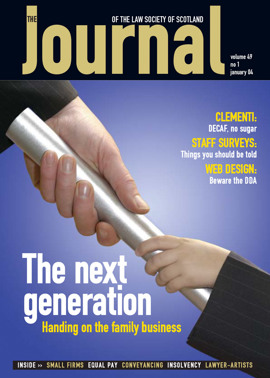Editorial: June 2021
How will the pandemic experience and the rapid development of remote court hearings affect the future conduct of civil litigation? That was the subject of an important day-long conference held in May, with top level presentations from across the legal profession.
It should be recognised how far we have come in a very short time. What was expected to take years of developing and rolling out new IT was achieved in months. Nor should we be surprised that with such a pace, difficulties have arisen that courts, litigants and their representatives have had to work through between them in real time.
The extent to which these problems can be overcome, and remote hearings deliver – and, crucially, be seen to deliver – justice, remains controversial. Both the Society and the Faculty of Advocates report a clear pattern of opinion from member surveys that remote hearings work well for procedural matters but not for proofs. Debates and appeals fall somewhere in between. Quite strong views have been expressed about returning to in-person hearings as the default for all key stages of a case.
Future planning should take account of wider considerations such as the ability to conduct negotiations while at court, and the very real concerns for judicial wellbeing, and for the training and integration of new members of the profession. But we also need to recognise the new working patterns that will continue after the pandemic, and the ways in which remote hearings do make the courts, and therefore justice, more accessible to some people.
Certain constraints are bound to come into play, which dictate the need for a constructive approach. On the one hand, advocates of more far-reaching change appear to recognise – wisely – that progress must be based on consensus. On the other, it will be a long time before levels of outstanding business, necessarily for this purpose taking criminal and civil work together, permit the full relaxation of the special measures adopted on account of the pandemic, even assuming that is otherwise desirable – and there have been many comments that aspects of what has been adopted should be preserved for the longer term.
No one, at least, is content to rest with the position we have reached now. It is to be hoped that the same spirit of collegiality and cooperation that enabled the collective delivery of the means to keep the courts running through the pandemic, will come into play to shape a model for the future that will stand the test of time. Equally importantly, those involved may well need to free their thinking from the tramlines of traditional procedures and methods of conducting litigation.
Perspectives
Features
Briefings
- Criminal court: Doing justice with benefit fraud
- Corporate: Clarity is king – win some, lose some
- Agriculture: TFC provides holdings compliance guide
- Employment: Unintentional wrongs and injured feelings
- Sport: Where now for worker status?
- Intellectual property: IP and artificial intelligence
- Property: EWS1: another hurdle for the lawyer
- Scottish Solicitors' Discipline Tribunal
In practice
- Society's new office bearers step up
- AGM hears of a challenge met
- How do you manage the bank manager?
- Letters of engagement: one size does not fit all
- Climate change, inequality and the profession
- Fairness and justice: nice and simple does IT
- Profile: Craig Connal
- The Eternal Optimist: Difficult, or just different?
- Ask Ash: An anxious return






